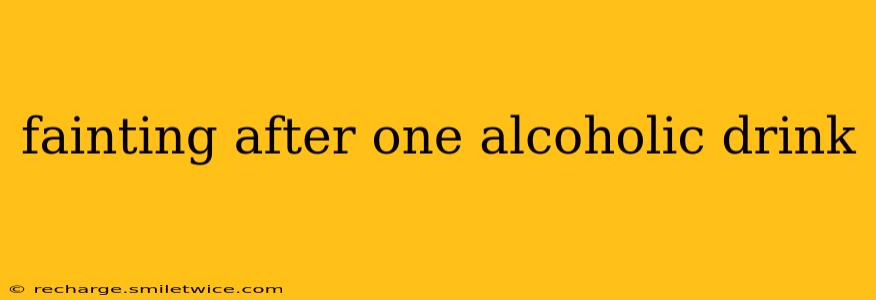Fainting, or syncope, after consuming just one alcoholic beverage can be alarming and warrants immediate attention. While many associate alcohol with impaired coordination and judgment, sudden fainting after a single drink suggests an underlying medical condition rather than simple intoxication. This isn't typical and requires careful investigation. This comprehensive guide explores the potential causes, associated risks, and necessary steps to take if you or someone you know experiences this.
What Causes Fainting After One Alcoholic Drink?
The human body reacts differently to alcohol, and several factors contribute to the possibility of fainting after just one drink. It’s rarely a direct consequence of the alcohol itself at such low doses; instead, it points toward pre-existing conditions that alcohol exacerbates. Some key potential causes include:
- Low Blood Pressure (Hypotension): Alcohol can cause vasodilation, widening blood vessels and leading to a drop in blood pressure. Individuals with pre-existing low blood pressure are particularly vulnerable to fainting, as even a mild reduction can trigger syncope.
- Dehydration: Alcohol has a diuretic effect, increasing urine production and potentially leading to dehydration. Dehydration can significantly lower blood volume, further contributing to a drop in blood pressure and fainting.
- Underlying Cardiovascular Issues: Conditions like arrhythmias (irregular heartbeats), heart valve problems, or autonomic nervous system disorders can make individuals more susceptible to fainting, particularly when combined with the effects of alcohol. Alcohol can disrupt the heart's rhythm and exacerbate these underlying conditions.
- Medication Interactions: Certain medications interact negatively with alcohol, potentially lowering blood pressure or affecting heart function. Always consult a doctor or pharmacist about potential interactions before mixing alcohol with medication.
- Orthostatic Hypotension: This is a sudden drop in blood pressure upon standing up. Alcohol can worsen orthostatic hypotension, making it more likely to faint after standing up quickly after consuming even a small amount of alcohol.
- Hypoglycemia (Low Blood Sugar): While less common, alcohol can affect blood sugar levels, particularly in individuals with diabetes or impaired glucose regulation. Low blood sugar can lead to fainting.
- Anxiety and Vasovagal Syncope: The anticipation of drinking alcohol, especially if associated with anxiety or fear, can trigger vasovagal syncope, a common cause of fainting. The alcohol itself might exacerbate this response.
Can One Alcoholic Drink Cause a Severe Reaction?
Yes, for individuals with certain pre-existing conditions, even a single alcoholic drink can trigger a severe reaction leading to fainting. This highlights the importance of understanding your personal health and any potential sensitivities to alcohol. The severity of the reaction depends on the individual’s health status and the specific underlying condition.
What Should I Do If I Faint After One Drink?
Fainting is a serious event that demands immediate medical attention. If you or someone you know faints after one alcoholic drink:
- Seek Medical Help: Call emergency services (911 or your local equivalent) or get the person to a hospital immediately.
- Monitor Vital Signs: If possible, monitor the person's breathing, pulse, and level of consciousness until medical help arrives.
- Lie the Person Down: Place the person in a comfortable position on their side to prevent choking if vomiting occurs.
- Avoid Further Alcohol Consumption: Do not give the person any more alcohol.
Is It Always Serious When Someone Faints After One Drink?
While not always an immediate life-threatening emergency, fainting after one drink should not be dismissed. It strongly suggests an underlying medical issue that requires investigation and treatment to prevent future occurrences. It's crucial to seek medical attention to determine the root cause and receive appropriate medical care.
How Can I Prevent Fainting After Drinking Alcohol?
If you have a history of fainting after drinking alcohol, preventative measures are crucial:
- Consult a Doctor: Schedule a thorough medical examination to identify any underlying conditions that might contribute to fainting.
- Moderate Alcohol Intake or Abstinence: Avoid alcohol completely or significantly reduce your intake if you experience fainting after drinking.
- Stay Hydrated: Drink plenty of water throughout the day, especially before and after consuming alcohol.
- Be Mindful of Medications: Always discuss potential medication interactions with your doctor or pharmacist before consuming alcohol.
- Rise Slowly: Avoid sudden movements or standing up too quickly after consuming alcohol.
Fainting after just one alcoholic drink is a serious sign and requires prompt medical evaluation. While the immediate cause might be alcohol-related vasodilation or a similar effect, the underlying reason often lies in a pre-existing condition. Early diagnosis and appropriate management can prevent serious consequences. If you experience this, seeking medical attention should be your priority.
